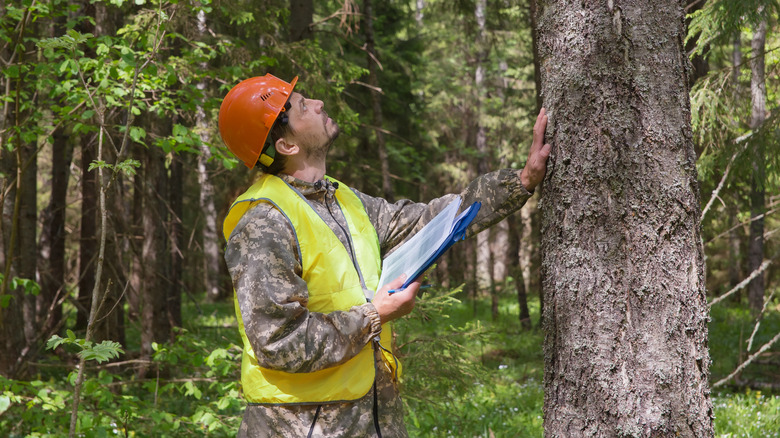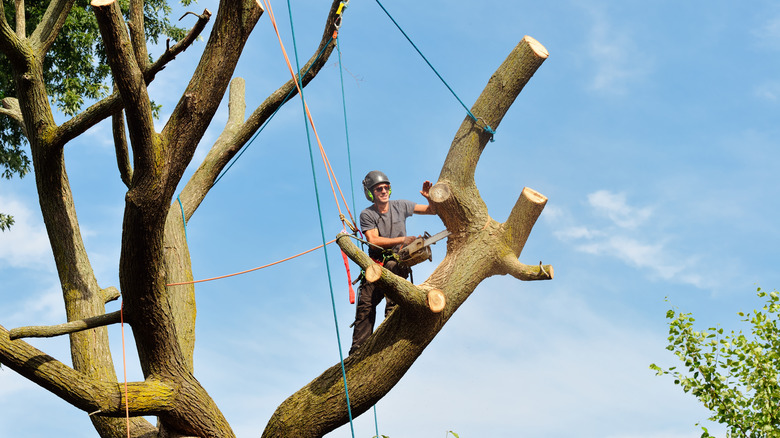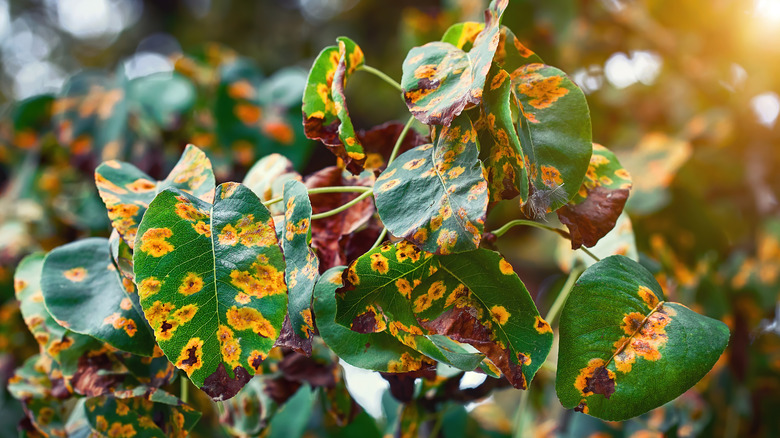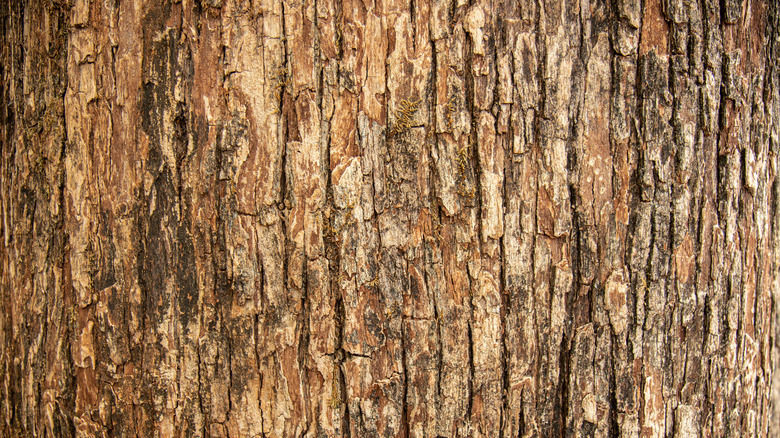Signs You Need To Call A Tree Service, According To An Expert
Having large and full leafy trees on your property can add to the overall beauty and curb appeal of your home. They provide a habitat for local wildlife as well as some much-needed and appreciated shade during the sunny months. Regular maintenance of your trees and shrubs does more than improve the view from the inside as you look out through the picture window, it can also prevent any damage to the foundation of your home or driveway, according to DreamWorks Tree Services. Additionally, maintenance will be necessary in the event that you need to clear space to install a pool or build a larger patio.
That's why it's important to know what to do if you have any concerns about your foliage. In an exclusive House Digest interview, we asked the owner of Green & Gold Tree Removal of Green Bay, Ryan Kinsler, to explain what to keep an eye out for so you know when exactly to call a tree service. "Paying attention to the signs of your tree's health is essential to maintaining the safety of your property and the health of your trees," Kinsler says. "Tree experts are trained to identify and diagnose tree problems, and they can provide the best solution to keep your trees healthy and safe."
Leaning trees or dying branches
To the untrained eye, you may not know that the trees on your property are even in trouble. Expert Ryan Kinsler has a few helpful tips on how to spot the red flags so you can call an arborist to assess the health of your timber. "One of the most obvious signs is if a tree begins leaning dangerously at a sharp angle," he explains. "A fallen or leaning tree can cause damage to your property and even injury." An important thing to know as a homeowner is that, in most cases, if the tree stands on your property and not that of the city, it is your responsibility. This means that if a stray branch has caused damage to your neighbor's home, then you may be liable. It's one more reason to take care of your trees.
"Another thing to look out for is if a tree has dead or dying branches," Kinsler says. "These can be a sign of disease or pests and can be a danger to the tree and the surrounding area." Common pests within the U.S. include gypsy moths, tent caterpillars, spruce budworms, bark beetles, wood borers, and scale insects, per the Arbor Day Foundation, all of which can do their part in devastating the health of your trees and those around them.
Unhealthy leaves or fungus growth
In some cases, there may be very visible signs that your tree is not doing its best. "If you notice that the leaves on your tree are turning brown or yellow during a season they shouldn't be, it may be a sign that the tree is not getting enough water or nutrients. Tree surgeons or tree service providers can diagnose the issue and provide solutions to keep your tree healthy," advises Kinsler. Although you may consider taking care of the situation yourself by providing rich soil protected by mulch, and a generous amount of water, there are occasions when you'll want the help of a seasoned professional.
"Another sign to be aware of is mushrooms growing at the base of your tree," Kinsler goes on to say. "This can indicate that the tree is rotting from the inside out. Again, this can be a safety risk." If the tree is weakened from the inside, there's a potential danger of it falling down and injuring someone, or causing damage to property. To avoid these unnecessary hazards, it's beneficial to tackle the problem right away.
Cracks in the trunk or unhealthy bark
On average, certain species of trees can live up to 150 years, but this lifespan is dramatically reduced when they are planted in residential neighborhoods. Because of poor soil, air pollution, and health risks from pests, trees planted in urban areas may only survive as few as 28 years, according to University of Illinois Extension. Employing professional arborists that you can trust will ensure your trees live as long as possible. As well as discoloration of the leaves, there are other surface tells that could be a cause of concern for the health of your trees. "If you notice any cracks or cavities in the trunk of your tree, it's important to call a tree service," expert Ryan Kinsler explains. "These can be a sign of internal decay and can weaken the structural integrity of the tree."
Before you try to remove the problem yourself, make sure to have the situation looked at first. "Professionals can determine the extent of the damage and take action to prevent the tree from falling," Kinsler mentions. "In addition, if you see that the tree's bark is peeling or the tree has a lot of holes, it may be a sign of pests or disease." With professional treatment, it can be determined whether your tree can be saved or what measures need to be taken in order to have it safely removed.



